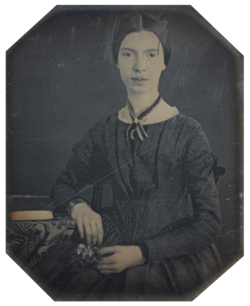Emily Dickinson (1830–1886) was an American poet whose work profoundly influenced modern poetry. Born in Amherst, Massachusetts, Dickinson led a reclusive life, rarely venturing outside her home. Despite her seclusion, she produced nearly 1,800 poems, though only a handful were published during her lifetime—and often without her consent or under heavy editorial revision.
Dickinson’s poetry is known for its brevity, unconventional punctuation, slant rhyme, and deep emotional resonance. She explored themes such as death, immortality, nature, love, and the self with an intensity that defied the literary conventions of her era. Her poems, like “Because I could not stop for Death” and “I heard a Fly buzz—when I died,” display a unique perspective on mortality, often blending the mystical with the mundane.
In an age when the literary world was dominated by male voices and public expression, Dickinson’s introspective, highly individualistic style offered a fresh lens through which to understand human consciousness. Her compressed language and experimental form laid the groundwork for future poetic innovations, influencing modernist and postmodernist writers alike.
Today, Dickinson’s work finds renewed relevance in a world increasingly shaped by individualism, introspection, and digital solitude. Her ability to distill complex emotions into a few lines mirrors the bite-sized expression of thought prevalent in global online culture. Although largely unknown in her lifetime, Emily Dickinson is now celebrated as one of America’s greatest poets—a voice that continues to speak powerfully to readers across cultures and generations.


